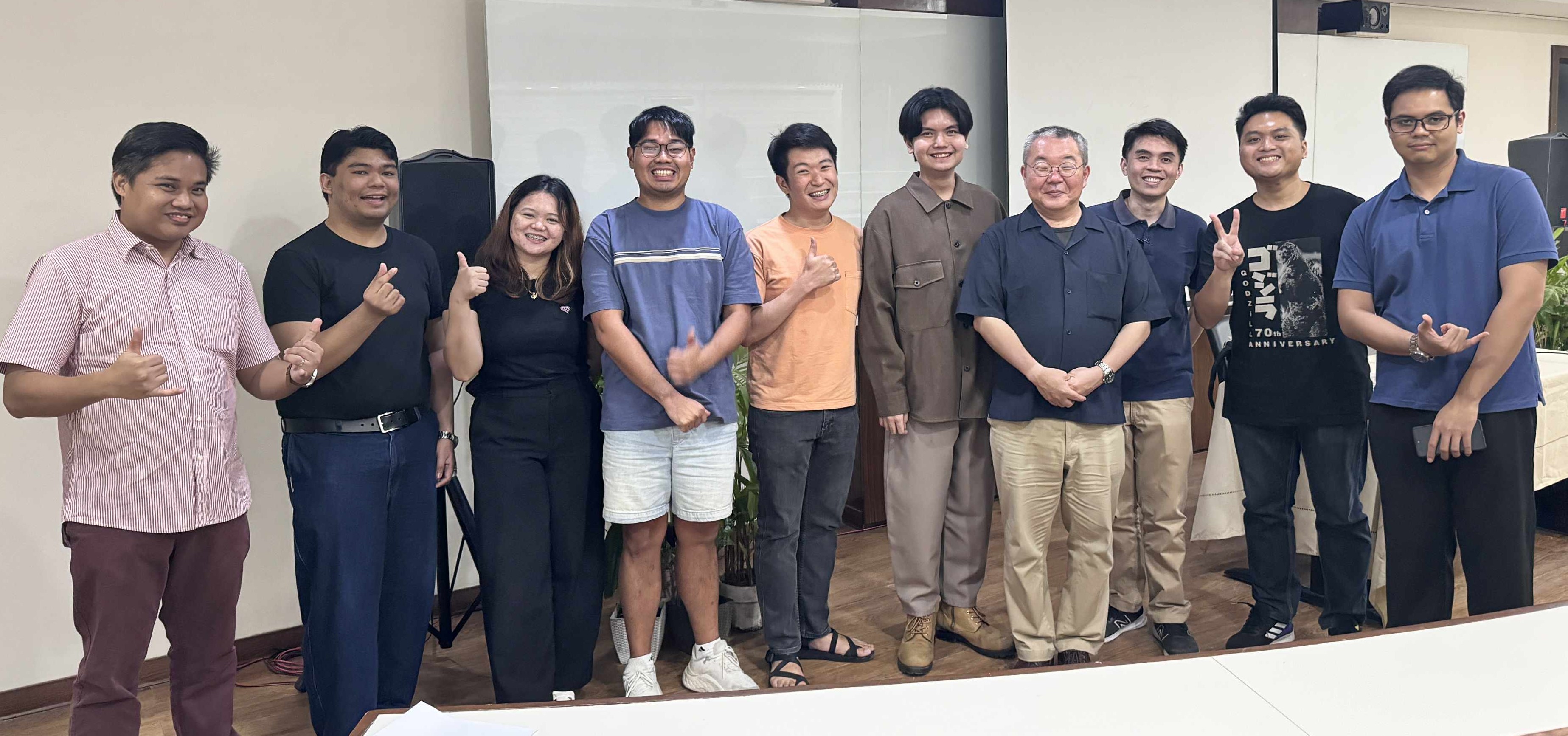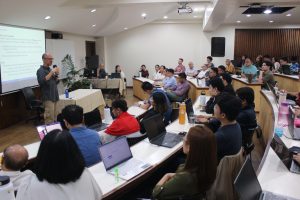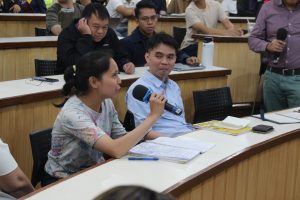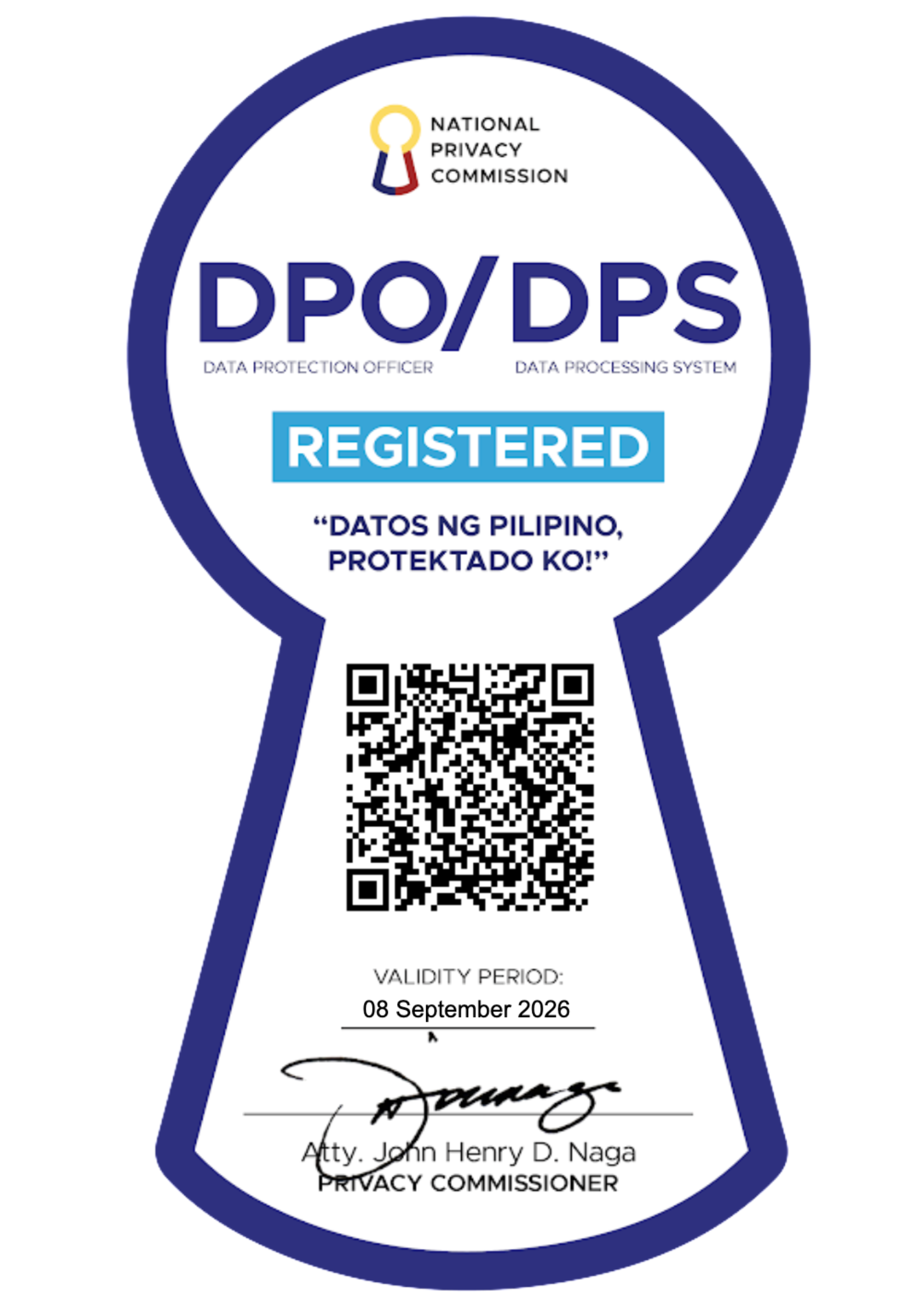Economics Research Center
The research activities of the School of Economics are being coordinated by the Economics Research Center (ERC). Known as the Institute of Economic Development and Research prior to the establishment of the School in 1965, ERC seeks to maintain a balance between the academic interests of the School faculty and its concerns with policy matters.
Scope and Thrusts
ERC’s research program covers diverse areas, including economic theory and econometrics, international trade and finance, fiscal management, human resources, population, poverty and income distribution, regional and rural development, resource and environmental economics, and growth and development.
The scope of its research activity is continuously expanding to accommodate emerging issues of interest, the growth of the faculty, and the needs of government for planning and policymaking. ERC’s research orientation is partly reflected in the increasing number of collaborative research projects involving not only faculty members and graduate students but also other scholars, as well as the extensive use of primary data collected wither by School projects or by external agencies.
Institutional Links
In recent years, ERC, through the School faculty, has undertaken various research projects with international and local research institutions such as the World Bank, the World Health Organization, the Food and Agriculture Organization, the Institute of Developing Economies of Japan, the Asian Development Bank, and agencies of the Philippine government like the Department of Economy, Planning, and Development (formerly the National Economic and Development Authority), the Department of Agriculture, the Department of Trade and Industry and the Philippine Institute for Development Studies. Some faculty members have also undertaken important policy research analyses for members of Congress.
Major Activities of ERC
The Economics Research Center or ERC oversees three main activities supportive of the School’s thrusts: visiting research associateships, research seminars, and publications.
Visiting Research Associateships
Visiting scholars spend between a few months to a year at the School to work on research topics usually dealing with aspects of Philippine economic development. Some of these scholars are Ph.D. candidates from various universities abroad; while others are professors and researchers on leave from their home institutions. All of them come with their own sources of financial support but the School gives them access to facilities (own office, computers) and services (library).
For instance, the Institute of Developing Economies, a Japan-based semi-government research institution, has sent four (4) visiting research fellows in the past to undertake join research projects with the School’s faculty members.
The School has also had visiting scholars from universities like Yale University, University of Chicago, University of Pennsylvania, Kyoto University, Oxford University, Australian National University, and University of Surrey, just to name a few, as well as international organizations like the RAND Corporation.
The interactions between researchers and academicians of international institutions and the School’s faculty have widened the faculty’s economic horizon and have extended the School’s presence in various economic institutions abroad.
Research Seminars
Seminars are regularly held on Fridays (except during semestral vacations, holidays, and summer) and occasionally on Wednesdays. They supplement formal courses and provide a forum for intellectual exchange.
The school holds an average of 25 seminars a year. Speakers have included Nobel Prize Laureate Lawrence Klein, internationally renowned economists such as Paul Krugman, Rudiger Dornbusch, and Jeffrey Sachs, as well as Philippine economists and researchers tackling important economic problems of the country.
Linkages with these institutions and agencies have contributed much to the growth of the Center’s research outputs in terms of addressing emerging economic issues.
For more information, email or call the UPSE Research Office, UP Diliman:
Tel. No. (632) 8920-5465; (632) 8981-8500 loc. 3478
Email: upseresearch.upd@up.edu.ph; pced_research@pced.gov.ph
Health Economics Program
The Health Economics Program (HEP) of the UP School of Economics began with the pioneering efforts of Dr. Alejandro N. Herrin to obtain grants for health economics research and support for graduate students interested in health issues in the early 1980s. Since then, the HEP has sought to: (1) train skilled professionals who can undertake economic analysis of health and development issues; (2) undertake academic as well as policy-oriented research on health issues; and (3) disseminate research-generated information and knowledge relevant to health and development policy to a wide audience of policy makers, stakeholders and the academe. Its main activities are supervised and implemented by the Health Economics Program Committee which consists of full-time faculty members who count health economics among their areas of expertise.
The training objectives of the program are fulfilled through regular course offerings in health economics at the undergraduate and graduate level, support to thesis and dissertation writers dealing with economic analysis of health issues, and participation in the design and conduct of training curricula in health economics and policy analysis. The HEP has regularly offered undergraduate Health Economics (Economics 186) as well as graduate Health Economics (Economics 286) and Health Policy (Economics 287) electives. These courses provide basic training in application of economic concepts and tools to the analysis of health and health system issues. Theses and dissertation writers whose topics are related to health have been supervised by members of the HEP committee. From 1991, at least 6 PhD and 13 MA/MDE graduates have written dissertations or MA theses in health. Other recent graduates have gone on to positions in the academe, while a number of alumni are now actively involved in health policy work. Committee members have also developed course materials and curricula for health economics and health policy modules of various training programs of the Department of Health (DOH) intended for both national and LGU level health workers and stakeholders. These training programs include the World Bank (WB)-DOH Flagship Course on Sustainable Financing and the DOH Introductory Course on Principles of Health Systems Reform. Members of the committee have also served as lecturers in these training programs.
Members of the HEP have extensively participated in local and international academic and policy oriented research projects, in their individual capacities as well as through UPecon Foundation, Inc . These have led to extensive and intensive contributions to health policy development not only in the Philippines but also in such countries as China, Vietnam and Indonesia. In the last two decades, they were part of the implementation of the: (1) WB/DOH -Philippine Institute for Development Studies (PIDS)– Philippine Health Development Program (1990-1995) which provided baseline information on health care financing in the Philippines, (2) United States Agency for International Development (USAID)-funded Health Policy Development Program (HPDP) in 1992-1996, which led to the design and institutionalization of the Philippine National Health Accounts, the drafting of the 1995 National Health Insurance Act which created PhilHealth, and the design of the Comprehensive Health Care Agreements (CHCAs) between the DOH and local governments, (3) WB /DOH – Health Sector Reform Project (2003-2005) which led to the preparation of the World Bank loan agreement for National Health Sector Support Program of the DOH, (4) USAID-Philippine Tuberculosis Initiatives for the Private Sector Private Provider Study (2004-2006) which provided information on private provider knowledge, attitude and practice of TB-DOTs, (5) US National Institutes of Health (NIH) – Quality Improvement Demonstration Study (2003-2008), which analyzed the impact of health sector reforms on child health using a randomized experiment, and (6) European Union -GTZ Technical Assistance to the Health Sector Policy Support Programme (TAHSHSP, 2007-2010) which provided assistance to the DOH in systems changes. Members of the HEP are currently involved in the implementation of the second USAID funded Health Policy Development Program (2006-2012), the European Commission (EC) funded Health Equity and Financial Protection in Asia (2009-2013), and the AusAid supported University of Queensland project on Investment Case for Financing Equitable Progress towards MDGs 4 and 5 (2009-2011).
HEP research dissemination activities include the conduct of regular seminars, participation in local and international conferences and publication in international journals. Papers arising from the HEP research work have been published in such journals as the Social Science and Medicine, Health Policy and Planning, Health Economics Letters, Health Economics, Journal of Pediatrics, Singapore Economic Review, Philippine Review of Economics, Philippine Journal of Development, and Lancet, among others. Works in progress have also been circulated as part of the UPSE Discussion Paper Series.
HEP members have also provided advice to the top leadership in the DOH, participating in the crafting of the Health Sector Reform Agenda (HSRA), its advanced implementation framework FOURmula One (F1) for Health, and more recently the Aquino Health Agenda-Universal Health Care (AHA-UHC). Technical assistance has also been provided to local government units. HEP members have also provided advice and assistance to multilateral and bilateral institutions such as the World Bank, the Asian Development Bank (ADB), the USAID, and the EC.
In implementing these activities, members of the HEP have collaborated with local and international institutions such as the University of the Philippines College of Medicine- Department of Clinical Epidemiology (UPCM-DCE), University of California Berkely-Institute for Global Health, the University of Queensland School of Population Health and the Australian Knowledge Hub, and the Erasmus University-Rotterdam, among the more recent ones. HEP members have also worked with a network of researchers and health professionals spanning multiple disciplines including demography, medicine, clinical epidemiology, statistics, and public administration.
Financial Economics Program
For more information, email or call the Department Chair’s office:
Tel. No.: (632) 8920-5461 or 8981-85-00 local 3483
Email: upsechair.upd@up.edu.ph
Philippine Review of Economics
The Philippine Review of Economics is devoted to the publication of theoretical and empirical work in economic development. It is indexed in SCOPUS, RePEc, the Journal of Economic Literature and EconLit.
It welcomes papers about the Philippines and about other developing economies. It is also a forum for research findings that show the links of economics with other disciplines.
The PRE (Print ISSN 1655-1516 and Digital ISSN 2984-8156) is published bianually by the UP School of Economics (UPSE) in partnership with the Philippine Economic Society (PES).
Visit the website here.
For submission guidelines, visit this link.
Journal Articles
These are articles authored or edited by members of the UPSE faculty.
2026
- The decline of child stunting in 122 countries: a systematic review of child growth studies since the 19th century – by Dr. Joseph Capuno et al., BMJ Global Health, 2026
- Estimating Market Power in Agricultural Industries Using the Production Function Approach: Evidence from the Philippines – by Dr. Gabriel Angelo B. Domingo, Journal of Agricultural & Food Industrial Organization, 2026
2025
- Counterfactuals in economics and allied social sciences: Methods, applications, and debates – by Dr. JC Punongbayan and Dr. Alfredo Paloyo, Reference Module in Social Sciences, 2025
- Water Policy Reform’s Effect on Child Health – by Karl Robert L. Jandoc and Michael Ralph Abrigo, International Journal of Economic Policy Studies, 2025
- Fueling the transition: The infrastructure and retrofitting hurdles to natural gas uptake – by Karl Robert L. Jandoc, Raul V. Fabella, Majah-Leah V. Ravago, Brian Jason H. Ponce, Mithi Maria Peñaranda, and Renzi G. Frias, Energy for Sustainable Development, Volume 89 , 2025
- Debt, Dictatorship, and Decline: The Enduring Economic Impact of the Philippines’ 1980s Crisis – by Emmanuel S. de Dios and Jan Carlo B. Punongbayan, Review of Development Economics 1–12 , 2025
- Impact of Livelihood Projects on the Fishing Households’ Income and Wealth: The Case of Fisheries, Coastal Resources, and Livelihood (FishCORAL) Project in Eastern Visayas, Philippines – by Josefina F. Ballesteros, Ian Dave B. Custodio, Jay-ar O. Ragub, Karl Robert L. Jandoc, Evangeline M. Paran, Jam M. Colas-Villaber, and Meylene C. Rosales, Philippine Journal of Development , 2025
- Do small bank deposits run more than large ones? Three event studies of contagion and financial inclusion – by Dante B. Canlas, Johnny Noe E. Ravalo, and Eli M. Remolona, Journal of Financial Stability , 2025
- Supply and demand components of Philippine inflation, 2001–2024 – by Jan Carlo B. Punongbayan, Applied Economics Letters , 2025
- Inclusive Business Models as a Driver of Sustainable Peace – by Annette Pelkmans- Balaoing, in Trade for Peace: Pathways to Sustainable Trade and Peace, World Trade Organization, 2025
2024
- The Philippine Journal of Development in the Early 21st Century (2002–2023) – by Jan Carlo B. Punongbayan, Philippine Journal of Development, 2024.
- Public Spending on R&D: Recent Issues in the Philippines – by Karl Robert Jandoc, Benjamin Radoc, Ludigil Garces, Elsie Gutierrez, Mae Hyacinth Kiocho, Madrigal Macadato, Mark Manguera, and John Faust Turla, Millennial Asia, 2024.
- Identification with dominant ethnic groups and attitudes towards government redistribution in Southeast Asia – by Joseph J. Capuno, Asia and the Global Economy, 2024.
- Gaps and Fiscal Adjustment for Debt Stability in Climate-Vulnerable Developing Countries: How Large and by How Much? – by Toby Melissa C. Monsod, Justin M. Muyot, and Maria Socorro Gochoco-Bautista, Journal of Globalization and Development, 2024
- Balancing excellence and equity in predictive college admissions: insights from the University of the Philippines – by Jan Carlo B. Punongbayan, Education Economics, 2024
- The Impact of Competition on Poverty and Inequality: The Philippine Case Using a Microsimulation Method – by Karl Robert Jandoc, Geoffrey Ducanes, and Irene Jo Arzadon (A. Balisacan, Y. Elhan-Kayalar, M.L. Ravago, J. Roumasset, Y. Sawada, and T. Sonobe, editors), Asian Development Bank and Asian Development Bank Institute, 2024
- Strategic Ambiguity in the Time of a Second Cold War – by Maria Joy V. Abrenica, Ricardo Rafael S. Guzman, and Anthony G. Sabarillo, Asian Economic Papers, 2024
- Politico-economic determinants of the performance of electric cooperatives in the Philippines – by Laarni C. Escresa and Adrian Matthew G. Glova, Utilities Policy, 2024
- Missed opportunities for hypertension screening of older people in the Philippines: cross-sectional analysis of nationally representative individual-level data – by Aleli D. Kraft, Joseph J. Capuno, Kayleen Gene R. Calicdan, Grace T. Cruz, and Owen O’Donnell, The Lancet Regional Health – Western Pacific, 2024
- Conversations with Social Scientists: Economist Emmanuel S. de Dios, PhD – by Jan Carlo B. Punongbayan, Social Science Diliman: A Philippine Journal of Society and Change, 2024
- Nonlinearities in the Intellectual Property-Manufacturing Growth Nexus in the Post-TRIPS Era: Evidence from a Dynamic Panel – by Vincent Jerald R. Ramos and Sarah Lynne S. Daway-Ducanes, Journal of the Knowledge Economy, 2024
- Export competition with China and firms’ coping strategies – by Katariina Nilsson Hakkala and Yao Pan, Economica, 2024
- Accelerated demographic and economic transition calls for resolute socioeconomic policies – by Ernesto Pernia, SciEnggJ, 2024
- Measurement of corruption – by Laarni Escresa and Lucio Picci, in Elgar Encyclopedia of Corruption and Society (L. de Sousa and S. Coroado, editors; Edward Edgar Publishing, 2024)
- Technological Innovation, Productivity, and Global Value Chains Participation of Philippine Manufacturers – by Adrian R. Mendoza, The Developing Economies, 2024
- Covid Lockdown and Employment in the Philippines – by Geoffrey M. Ducanes and Sarah Lynne S. Daway-Ducanes, Journal of Development Studies, 2024
- Much a Duterte about Nothing: Continuity, Complacency, and Crisis in the Philippine Economy (2016–23) – by Jan Carlo B. Punongbayan, in Games, Changes, and Fears: The Philippines from Duterte to Marcos Jr. (A. Arugay and J. Encinas-Franco, editors; ISEAS – Yusof Ishak Institute, 2024)
- Natural disasters and local government finance: Evidence from Typhoon Haiyan – by Joseph Capuno, Jose Rowell Corpuz, and Samuel Lordemus, Journal of Economic Behavior & Organization, Vol. 220, April 2024
2023
- Agricultural Development in Asia and Africa: Essays in Honor of Keijiro Otsuka (Springer Open, 2023) – by Jonna P. Estudillo, Yoko Kijima, & Tetsushi Sonobe (editors)
- Nuances in the effect of types of intimate partner violence on aspects of child development: Evidence from the Philippines – by Arjay Julio, Karizza Gem Reopta, & Karl Robert Jandoc, Child Abuse & Neglect, Volume 138, 2023
- The Economy Fifty Years since Martial Law: Changing Landscapes, Unchanged Views – by Dr. Emmanuel S. de Dios, in Martial Law in the Philippines: Lessons and Legacies, 1972–2022 (Edilberto C. de Jesus and Ivyrose S. Baysic, editors; Ateneo de Manila University Press, 2023)
- Population Management and Inclusive Economic Growth: We Reap What We Sow – by Dr. Ernesto M. Pernia, in Martial Law in the Philippines: Lessons and Legacies, 1972–2022 (Edilberto C. de Jesus and Ivyrose S. Baysic, editors; Ateneo de Manila University Press, 2023)
- Martial Law and the Philippine Economy – by Emmanuel S. de Dios, Maria Socorro Gochoco-Bautista, and Jan Carlo Punongbayan, in The Marcos Years: The Age of Crisis and Repression (Ferdinand C. Llanes, editor; SAMASA, 2023)
- False Nostalgia: The Marcos “Golden Age” Myths and How to Debunk Them (Ateneo de Manila University Press, 2023) – by Jan Carlo Punongbayan
- Labor Market Implications of the COVID-19 Pandemic in the Philippines (BSP, 2023) – by Dante B. Canlas (editor)
- Introduction – by Dante B. Canlas
- Labor Productivity, Structural Change, and COVID-19 – by Emmanuel F. Esguerra and Karl Robert L. Jandoc
- On the Labor, Macroeconomic, and Welfare Effects of Reduced Survival Probabilities in the Time of COVID-19 – by Sarah Lynne S. Daway-Ducanes
- The Impact of COVID-19 on the Retirement System for Private Sector Workers in the Philippines – by Renato E. Reside Jr.
- Conclusion: Economic Policy and Employment Growth – by Dante B. Canlas
- Don’t Let a “Good” Crisis Go to Waste: One-upmanship in Local Responses to the COVID-19 Pandemic – by Julian Thomas B. Alvarez, Jahm Mae E. Guinto, and Joseph J. Capuno, in Lockdown and Lowdown: The Politics of COVID-19 Pandemic Response in the Philippines (Rosalie Arcala Hall, editor; Ateneo de Manila University Press, 2023)
- The State of Play of ASEAN Global Value Chains – by Adrian R. Mendoza and James P. Villafuerte, in ASEAN and Global Value Chains: Locking in Resilience and Sustainability (M. Mikic, G. Sacerdoti, J. Villafuerte, and D. Zara, editors; Asian Development Bank, 2023)
- Risk factor contributions to socioeconomic inequality in cardiovascular risk in the Philippines: a cross-sectional study of nationally representative survey data – by Callum Brindley, Tom Van Ourti, Joseph Capuno, Aleli Kraft, Jenny Kudymowa, and Owen O’Donnell, BMC Public Health, Vol. 23, 2023
- Impacts of Gender and Household Characteristics on National Achievement Test Scores of Filipino Children – by Ma. Laarni D. Revilla and Jonna P. Estudillo, Philippine Sociological Review, Vol. 69 (2021), 2023.
- Weather, lockdown, and the pandemic: Evidence from the Philippines – by Marjorie Pajaron and Glacer Niño Vasquez, Philippine Journal of Science, Special Issue on Philippine Meteorological Research, 2023.
- Unlocking the flow of finance for climate adaptation: Estimates of ‘Fiscal Space’ in climate-vulnerable developing countries – by Toby Melissa C. Monsod, Mary Anne Majadillas, and Maria Socorro Gochoco-Bautista, Climate Policy, 2023.
- Governance, innovation networks, and climbing the upgrading ladder: The case of Philippine and Thai manufacturers in global value chains – by Adrian R. Mendoza, Journal of International Trade and Economic Development, 2023.
- The Philippines – by Edgar Avalos, Irene Jo E. Arzadon, Jaime Frias, Karl Robert L. Jandoc, Jesica Torres, and Trang Thu Tranin, in Crisis and Recovery: Learning from COVID-19’s Economic Impacts and Policy Responses in East Asia (World Bank, 2023).
- Generalized consistent ranking and the formation of self-enforcing coalitions – by Karl Jandoc and Ruben Juarez, Review of Economic Design, 2023.
- Reliability and Forced Outages: Survival Analysis with Recurrent Events – by Majah Leah V. Ravago, Karl Robert L. Jandoc, and Miah Maye Pormon, Japan and the World Economy, 2023.
Book Publications
These are books authored or edited by members of the UPSE faculty.
 |
Capitalism and Inclusion under Weak Institutions 2018. Author: Raul V. Fabella “… Drawing on an eclectic group of authors, including Schumpeter, Piketty, Marx and many others, the 11 chapters range far and wide, from macroeconomics and international economic policy to institutional change and social policy. Taken together, they persuasively set out an agenda for a fairer and more prosperous Philippines. Professor Fabella’s book is a must-read for anybody interested not only in the Philippines, but also the developing world in general.”– HAL HILL, H.W. Arndt Professor Emeritus of Southeast Asian Economies Australian National University To know more about the book, read the synopsis here.
|
| ————————— | |
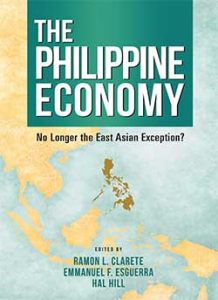 |
The Philippine Economy: No Longer the East Asian Exception? 2018. Editors: Ramon L. Clarete, Emmanuel F. Esguerra, Hal Hill In this volume, a leading group of scholars pose the question, has the Philippine economy rejoined the dynamic East Asian mainstream and, if so, what set of policies and priorities are required to maintain the strong economic momentum of recent years? Successive chapters address issues related to growth and poverty, infrastructure and urbanization, education, health, the environment, energy, development finance, and governance and institutions.This volume has been written with a broad audience in mind. First and foremost it is for readers in, and interested in, this fascinating and important country with a population that now exceeds 100 million people. Second, it will appeal to those in the broader development community with an interest in the analytical and policy challenges that democratic, middle-income countries face as they struggle to lift their citizens out of poverty and to achieve broad-based and environmentally sustainable growth. |
| ————————— | |
 |
Core Concepts of Calculus with Applications 2018. Author: Rolando A. Danao This textbook offers a brief introduction to calculus designed for undergraduate students in disciplines that require only a semester of differential and integral calculus. Although emphasis is put on understanding concepts, the book promotes appreciation of the importance, vitality, and power of calculus through illustrative applications drawn from fields such as the physical sciences, economics, business, management science, engineering, public health, biology, and population dynamics. The book will also be helpful to other students as it contains the core concepts of calculus. Core Concepts of Calculus with Applications is a gentle introduction to calculus for university students who seek an understanding of the essentials of the course. The book maintains a sensible balance between rigor and intuition between the abstract and the practical… The book is well-written, well-laid out, and carefully edited … and will prove most beneficial to both instructors and students.– From the Foreword |
| ————————— | |
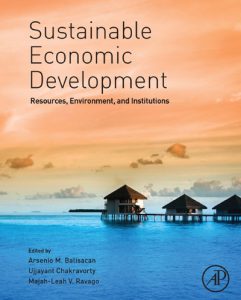 |
Sustainable Economic Development: Resources, Environment, and Institutions. 2014. Editors: Arsenio M. Balisacan, Ujjayant Chakravorty, and Majah-Leah V. Ravago. This book presents 25 articles that lay the foundations of sustainable development in a way that facilitates effective policy design. The editors mix broad thematic papers with focused micro-papers, balancing theories with policy designs.The book begins with two sections on sustainable development principles and practice and on specific settings where sustainable development is practiced. Two more sections illuminate institutions, governance, and political economy. Additional sections cover sustainable development and agriculture, and risk and economic security, including disaster management. This rich source of information should appeal to any institution involved in development work, and to development practitioners grappling with an array of difficult on-the-ground developmental challenges. To know more about the book, read the promo material. To order a copy, click here.
|
| ————————— | |
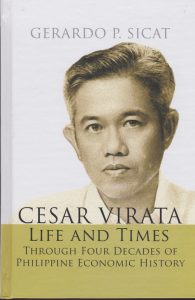 |
Cesar Virata: Life and Times Through Four Decades of Philippine Economic History. 2014. Author: Gerardo P. Sicat Published by the University of the Philippines Press “One of the least heralded of important national officials in our recent history, Cesar Virata is also one who has done so much for the country during his long years of service. His story had to be told, and I am glad that I have written it. …I hit upon the thought that if I could write the story of Cesar Virata, then I would be able to tell the story of the times much more effectively. I would get to see how that period contributed to the nation’s growth and prosperity. I would further be able to show how we got into some problems that we could have avoided more easily. In this way, perhaps, I would have succeeded in getting a fair deal on the story of the times.” – GPSicat (from Crossroads, Philippine Star Column) |
| ————————— | |
 |
2012/2013 Philippine Human Development Report Published by the Human Development Network (HDN) in cooperation with the United Nations Development Programme (UNDP), the 2012/2013 Philippine Human Development Report with the theme “Geography and Human Development” is the 7th in the series of Reports which began in 1994. It focuses on geography as a deep determinant of human development and examines how it is linked to human development outcomes across provinces.You can download the full report as well as the previous reports from the HDN website. |
| ————————— | |
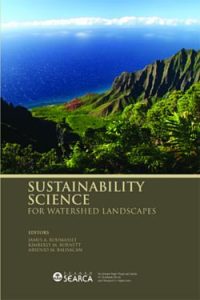 |
Ravago, Majah‐Leah V., James Roumasset, and Arsenio Balisacan. 2010. “Economic Policy for Sustainable Development vs. Greedy Growth and Preservationism,” in J. A. Roumasset, K. M. Burnett, and A.M. Balisacan (eds.), Sustainability Science for Watershed Landscapes. Singapore: Institute of Southeast Asian Studies; Los Baños, Philippines: Southeast Asian Regional Center for Graduate Study and Research in Agriculture.”Sustainability science addresses the central challenge facing global society of how to reduce poverty and meet demands of a large human population desiring a good life while simultaneously maintaining the environment that provides the life support system on which long-term prosperity depends. This book provides evidence and insight into key elements of what is required to achieve sustainability by framing important policy questions and illustrating the consequences of policy alternatives in systems with complex interactions.” – Stephen Polasky, University of Minnesota |
| ————————— | |
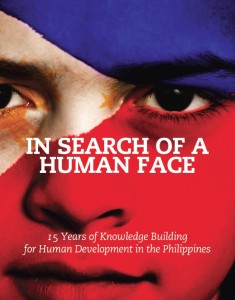 |
In Search of a Human Face: 15 Years of Knowledge Building for Human Development in the Philippines This volume compiles the theme chapters of the 1994, 1997, 2000, 2002, and 2005 editions of the Philippine Human Development Report and postscripts from third-party experts who reflect on their continuing relevance while also providing fresh insight and augmenting the original analysis. The proceedings of “Human Development in the Philippines: 15 Years of Research and Advocacy,” a roundtable discussion held in October 2009, is also featured. This book is published by the Human Development Network (HDN) in cooperation with the United Nations Development Programme (UNDP).You can download the full report from the HDN website. |
| ————————— | |
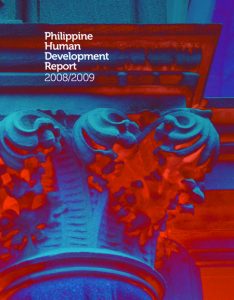 |
2008/2009 Philippine Human Development Report This report has the theme “Institutions, Politics and Human Development in the Philippines”. The Philippine Human Development Network (HDN) in collaboration with the United Nations Development Programme (UNDP), the New Zealand Agency for International Assistance (NZAID) and the Philippine Institute for Development Studies (PIDS) published this volume.You can download the full reportfrom the HDN website. |
| ————————— | |
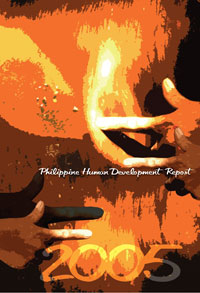 |
2005 Philippine Human Development Report Given the severity of the situation and the extreme costs it imposes upon the country’s social and economic development, the 5th Philippines Human Development Report (5th PHDR) sets out to explore the various dimensions and major sources of conflict in the country; analyze the current dynamics that may assist to resolve or aggravate conditions; and relate these to the concept of human development and human security in the context of the country’s development strategy. The Report presents the latest statistics on provincially disaggregated Human Development Indicators, Human Poverty Indicators, Gender-related Development Indicators, and Human Security Indicators. Based on these indicators, the Report attempts to identify the provinces which are the “most peaceful and stable” as well as those that are “most vulnerable and at risk.” The theme of the 5th PHDR is “Peace, Human Security and Human Development” in the Philippines.You can download the full report from the HDN website. |
| ————————— | |
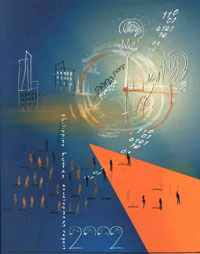 |
2002 Philippine Human Development Report This volume’s theme is “Work and Well-Being.” Work is perhaps the most vital component of human development. Immediately it means income and survival. But with it also comes self-worth, social recognition, and healthy mental and emotional state. It is essential to well-being both as a means-to-an-end and as an end-in-it-self.You can download the full report as well as the previous reports from the HDN website. |
| ————————— | |
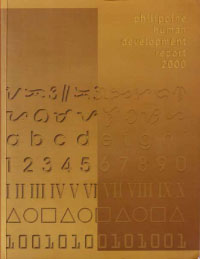 |
2000 Philippine Human Development Report The 2000 PHDR, with the theme “Quality, Relevance and Access in Basic Education”, was adjudged by the UNDP Human Development Report Office as the best national human development report in the Asia-Pacific Region for the period 1999-2000 along with the China report. The UNDP cited the Philippine report for its excellent use of human development tools, presentation and design, and participatory approach and policy impact.You can download the full report as well as the previous reports from the HDN website. |
| ————————— | |
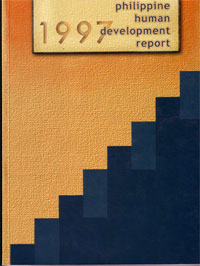 |
1997 Philippine Human Development Report This volume’s theme is “Changing Status of Women.” The enhancement of women’s capabilities and opportunities to make choices is an important element of human development. The gains attained by the Philippines in increasing women’s access to education and jobs in certain sectors, and participation in elections as voters and candidates have been significant. You can download the full report as well as the previous reports from the HDN website. |
| ————————— | |
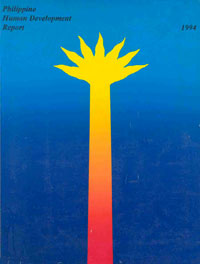 |
1994 Philippine Human Development Report
The Philippines is slowly emerging from the social ruins caused by decades if economic mismanagement and political dictatorship. The government can now afford to think about national goals and expand on them, suggesting that new opportunities besides mere survival may now indeed be open. The question, however is whether the people have genuine choices. How can they tell whether the programs and policies taken ostensibly in their behalf will actually contribute to their welfare? What does welfare mean, after all? The concept of human development has been advanced precisely to answer these similar questions. Human development is the process of enabling people to have wider choices. It means expanding those capabilities that enable them to live a full life as human beings. Its most important dimensions are a person’s physical survival, health, level of knowledge, livelihood or income, and political freedom. These are the minimum basic needs that must be fulfilled. You can download the full report as well as the previous reports from the HDN website. |
| ————————— | |
 |
Built on Dreams, Grounded on Reality: Economic Policy Reforms in the Philippines. 2011. Editors – Raul Fabella, Jaime Faustino, Adrian Leftwich, and Andrew Parker. This is a volume of case studies on Philippine economic policy reform that contributes to the discourse on institutional change to create a better understanding of how human actors engender change. This publication is made possible by the support of the United States Agency for International Development (USAID) and the Australian Agency for International Development (AusAID). |
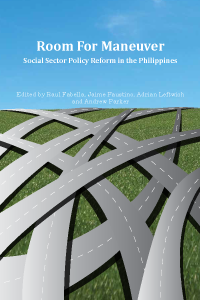 |
Room for Maneuver – Social Sector Policy Reform in the Philippines. 2013. Editors – Raul Fabella, Jaime Faustino, Adrian Leftwich, and Andrew Parker. This publication is a product of the AusAID-The Asia Foundation partnership in the Philippines, which supports, advises, and builds the capacity of coalitions and networks, together with their leaders and allies inside and outside of government, to catalyze positive policy change, enhance the impact of policy reforms and processes, achieve sustained, high-impact policy reform, capitalize on opportunities that broaden and deepen reforms, and improve communication and knowledge sharing among reformers and stakeholders. |
| ————————— | |
 |
Introduction to Statistics and Econometrics, second edition, authored by Dr. Rolando A. Danao, is a book for beginning econometrics students. The major change in this edition is the addition of a chapter on logistic regression, a model of binary choice that is now commonly used in many disciplines including economics. Other changes include a section on instrumental variable estimation, end-of-chapter appendices on the use of Stata, in addition to EViews, to implement econometric techniques, and editorial revisions to improve exposition. Despite these changes, this edition retains the basic purpose and the basic format of the first edition, which won the 2004 National Academy of Science and Technology Outstanding Book Award. (UP Press) |
| ————————— | |
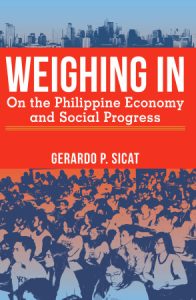 |
An eminent economist of the Philippines, Dr. Gerardo P. Sicat, shines a light on various aspects of the economy and social issues concerning his country. Examining the whole landscape involving economic prospects, investments, and changing perspectives, his investigations carry him to different subjects, from economic growth, the selling of the country as a tourism destination, OFW workers and labor migration, to Manila’s changing skyline. By digging beneath the surface, he unearths issues dealing with economic nationalism, corruption, the investment climate, and structural problems that need reform. (Anvil Publishing) |
| ————————— | |
 |
Ravago, Majah‐Leah V., James Roumasset, and Arsenio Balisacan. 2010. “Economic Policy for Sustainable Development vs. Greedy Growth and Preservationism,” in J. A. Roumasset, K. M. Burnett, and A.M. Balisacan (eds.), Sustainability Science for Watershed Landscapes. Singapore: Institute of Southeast Asian Studies; Los Baños, Philippines: Southeast Asian Regional Center for Graduate Study and Research in Agriculture. |
| ————————— | |
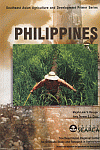 |
Ravago, Majah‐Leah V. and Amy Doreen S.J. Cruz. 2004. Southeast Asian Agriculture & Development Primer Series:Philippines , Los Baños SEARCA. |
| ————————— | |
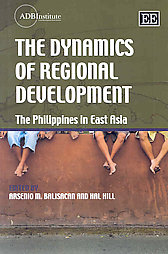 |
Balisacan, Arsenio M. (Editor)/ Hill, Hal (Editor). Synopsis: ‘The Dynamics of Regional Development‘ includes studies of regional development issues in the Philippines, commencing with historical and political dimensions, and including infrastructure, poverty and social progress, labour and migration, and regional impacts of liberalization and global integrations. |
| ————————— | |
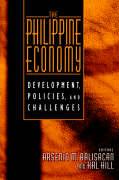 |
Balisacan, Arsenio M.; Hill, Hal. Synopsis: This book examines all major facets of the Philippine economy and development policy. Contributors to this volume look both to the past and to the future, and their approaches are variously descriptive, analytical, interpretive, and comparative. The book assesses trends since the 1980s, identifies major policy issues, and provides a balance sheet of achievements and deficiencies over the past decade and beyond. It highlights future challenges that need to be addressed if the country is to embark on a sustainable, durable, and equitable growth trajectory. The book also offers lessons from the country’s development experience which may be relevant for many countries at the present time. The volume has particular relevance for the country’s policymakers, academics and the business community, and will also appeal to a broader international audience. |
| ————————— | |
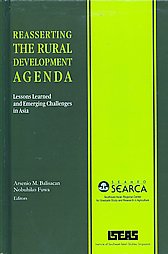 |
Arsenio M. Balisacan, Nobuhiko Fuwa. Published by Institute of Southeast Asian Studies, Singapore, 2007. Synopsis: The agricultural sector’s perceived importance in the international development circle waned dramatically after the 1980s, and investments in rural development and agricultural research and development declined sharply. This volume reasserts the role of agricultural and rural development in the economic development debate. By revisiting the evolution of ideas, paradigms and empirical evidence, and by drawing on Asian experiences, the book intends to set a reinvigorated agenda on agricultural and rural development both for research and policy discussions in the coming decades. Written by internationally acknowledged research scholars, this book is helpful to a wide range of audience, including researchers, policymakers, practitioners, and students interested in rural development in Asia and its future evolutions. |
 |
More Than is the only coffee table book of the UP School of Economics produced by an editorial team composed of the alumni, faculty and staff of the School. |
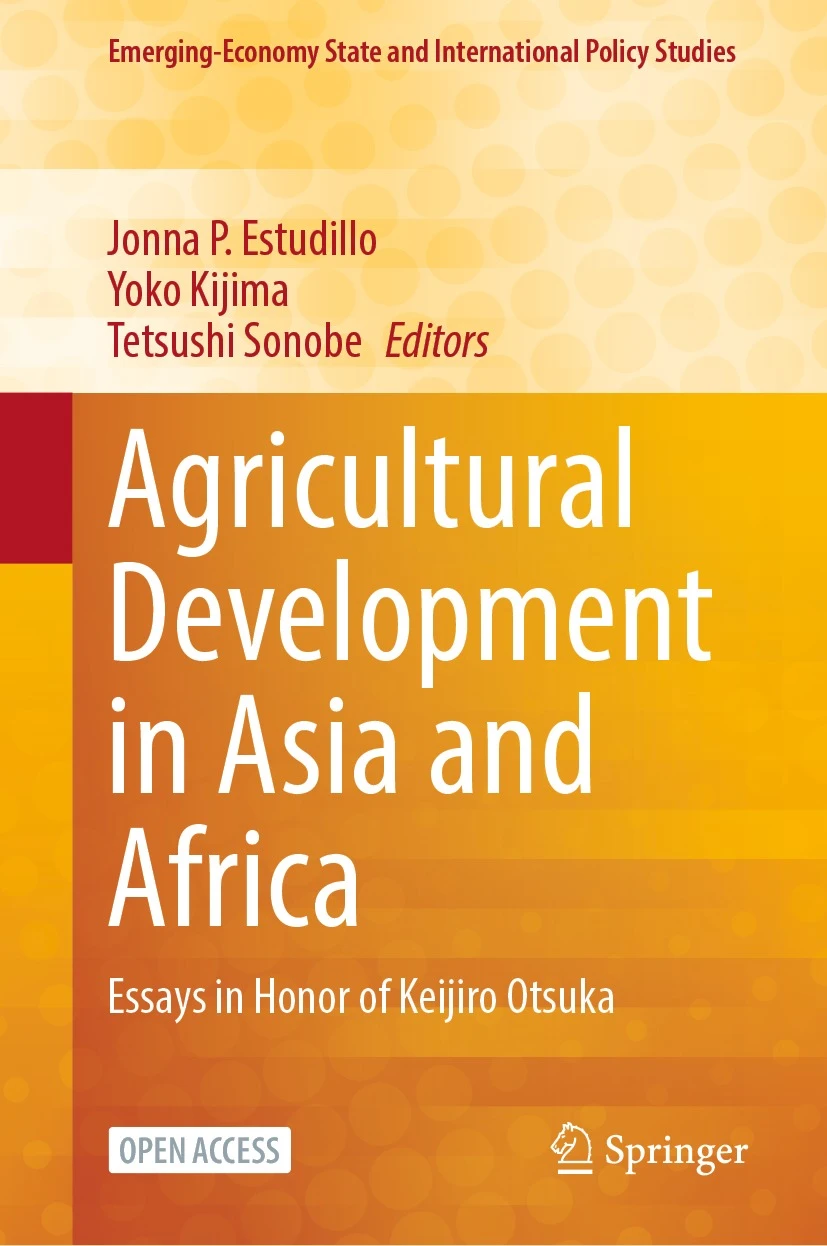 |
This book explores the Asian agricultural and rural development and assesses the extent to which the Asian experience is replicated in contemporary Africa. – by Jonna P. Estudillo, Yoko Kijima, & Tetsushi Sonobe (Editors) |
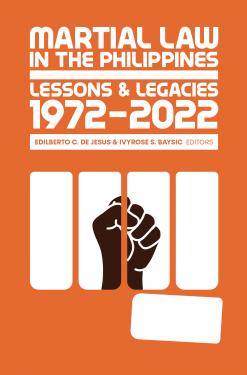 |
Twenty-two writers expound on martial law and its long-term effects on the country. “The Economy Fifty Years since Martial Law: Changing Landscapes, Unchanged Views” by Dr. Emmanuel S. de Dios, in Martial Law in the Philippines: Lessons and Legacies, 1972–2022 (Edilberto C. de Jesus and Ivyrose S. Baysic, Editors) |
 |
by Emmanuel S. de Dios, Maria Socorro Gochoco-Bautista, and Jan Carlo Punongbayan, in The Marcos Years: The Age of Crisis and Repression (Ferdinand C. Llanes, editor; SAMASA, 2023) |
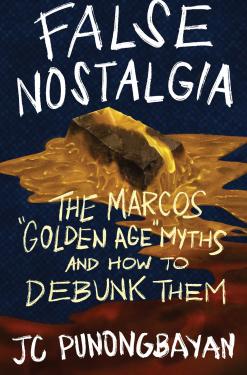 |
False Nostalgia, JC Punongbayan’s first book, dismantles the long-standing myth that the Marcos dictatorship ushered in a Philippine “golden age.” Drawing on hard facts and presented in clear, accessible language, it exposes Martial Law instead as a period of authoritarian abuse and economic crisis — offering urgent lessons for current and future generations.
– by Jan Carlo Punongbayan |
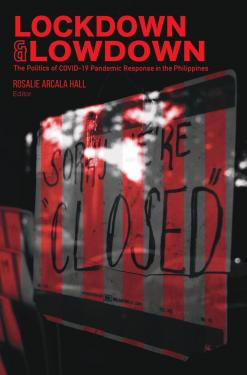 |
by Julian Thomas B. Alvarez, Jahm Mae E. Guinto, and Joseph J. Capuno, in Lockdown and Lowdown: The Politics of COVID-19 Pandemic Response in the Philippines (Rosalie Arcala Hall, editor; Ateneo de Manila University Press, 2023) |
| by Adrian R. Mendoza and James P. Villafuerte, in ASEAN and Global Value Chains: Locking in Resilience and Sustainability (M. Mikic, G. Sacerdoti, J. Villafuerte, and D. Zara, editors; Asian Development Bank, 2023) |
|
Discussion Papers
UPSE Discussion Papers are preliminary versions of ongoing research circulated to elicit critical comments.
Faculty, graduate students, visiting scholars, visiting faculty, and alumni are encouraged to submit discussion papers. Graduate student and alumni submissions should be sponsored by an UPSE faculty.
Please send a copy of your manuscript to upseresearch.upd@up.edu.ph with the subject heading “For DP posting“.
The manuscript should be in either PDF or MS Word file on letter size paper with the first page containing the following information:
- Paper title
- Full name and affiliation of all authors
- E-mail addresses of all authors
- A short abstract
- A short list of keywords
- JEL codes
Visit the website here.
Friday Seminars (FriSem)
Friday Seminars cover a wide range of topics on current and emerging issues in economics and related fields. It also features speakers who are experts, scholars, and professionals in their respective fields, leading to thought-provoking sessions that foster dialogue and cross-disciplinary collaboration. This provides a unique platform to deepen one’s understanding of today’s most pressing economic challenges and opportunities.
Mobile Number Portability in the Philippines: Switching Trends and DynamicsMr. Jestoni A. Olivo, Senior EconomistEconomics Office of the Philippine Competition Commission14 November 2025 |
|
Monetary Policy and Informal Labor MarketsDr. Chetan Ghate, Professor of EconomicsEconomics and Planning Unit, Indian Statistical Institute (ISI) – Delhi5 November 2025 |
|
Concentration and Union Activity in Local Labor Markets in the Philippines: Estimates and ImplicationsMr. Edgardo Manuel Jopson, Acting Division Chief, Business Economics Division at the Philippine Competition Commission24 October 2025 |
|
The Philippine Ecosystems and Natural Capital Accounting System (PENCAS): Evolution and Sustainable Development IndicesDr. Marian S. Delos Angeles, Board Chairperson at the Resources, Environment, and Economics Center for Studies, Inc. (REECS) and Professorial Lecturer at the UP Diliman School of Economics and UP Open University17 October 2025 |
|
Resilient Futures: Policy Priorities for Poverty Reduction and Middle-Class Expansion in the PhilippinesDr. Liliana D. Sousa, Senior EconomistPoverty and Equity Unit in the East Asian and Pacific Region, World Bank10 October 2025 |
|
COVID-19, Food Relief, and Social Distancing: Evidence from the Bayan-Bayanihan Program in the PhilippinesDr. Chistopher James R. Cabuay, Associate ProfessorCarlos L. Tiu School of Economics, De La Salle University3 October 2025 |
|
Infrastructure and Structural Transformation: Evidence from Satellite, Administrative and Multi-Generation Household Data in the PhilippinesDr. Yasuyuki Sawada, Professor, Faculty of Economics at the University of Tokyo1 October 2025 |
|
Demographic Trends in the PhilippinesProf. Lisa Grace A. Bersales, Professor Emeritus at the UP Diliman School of StatisticsUndersecretary for Planning and Development and Executive Director of the Commission on Population and Development12 September 2025 |
|
Recombination as an Important Mechanism of Prosocial Behavior in Cooperating BacteriaDr. Isaiah Paolo A. Lee, Asst. ProfessorUP Diliman National Institute of Molecular Biology and Biotechnology5 September 2025 |
|
Quasi-Hyperbolic Discounting, Mortality Risk, and Macroeconomic and Welfare OutcomesDr. Sarah Lynne S. Daway-Ducanes,UPSE Assoc. Professor27 August 2025 |
|
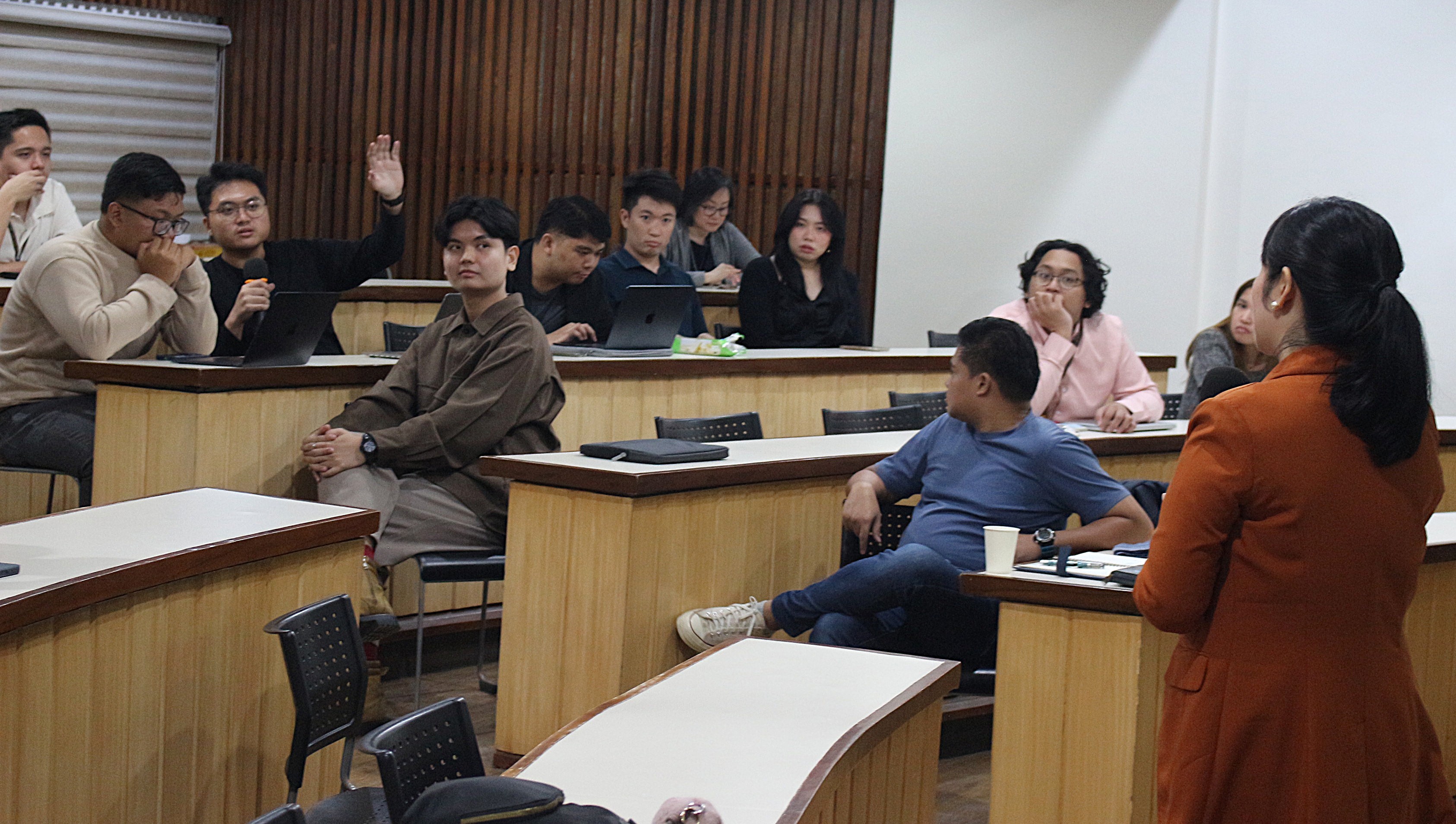 |
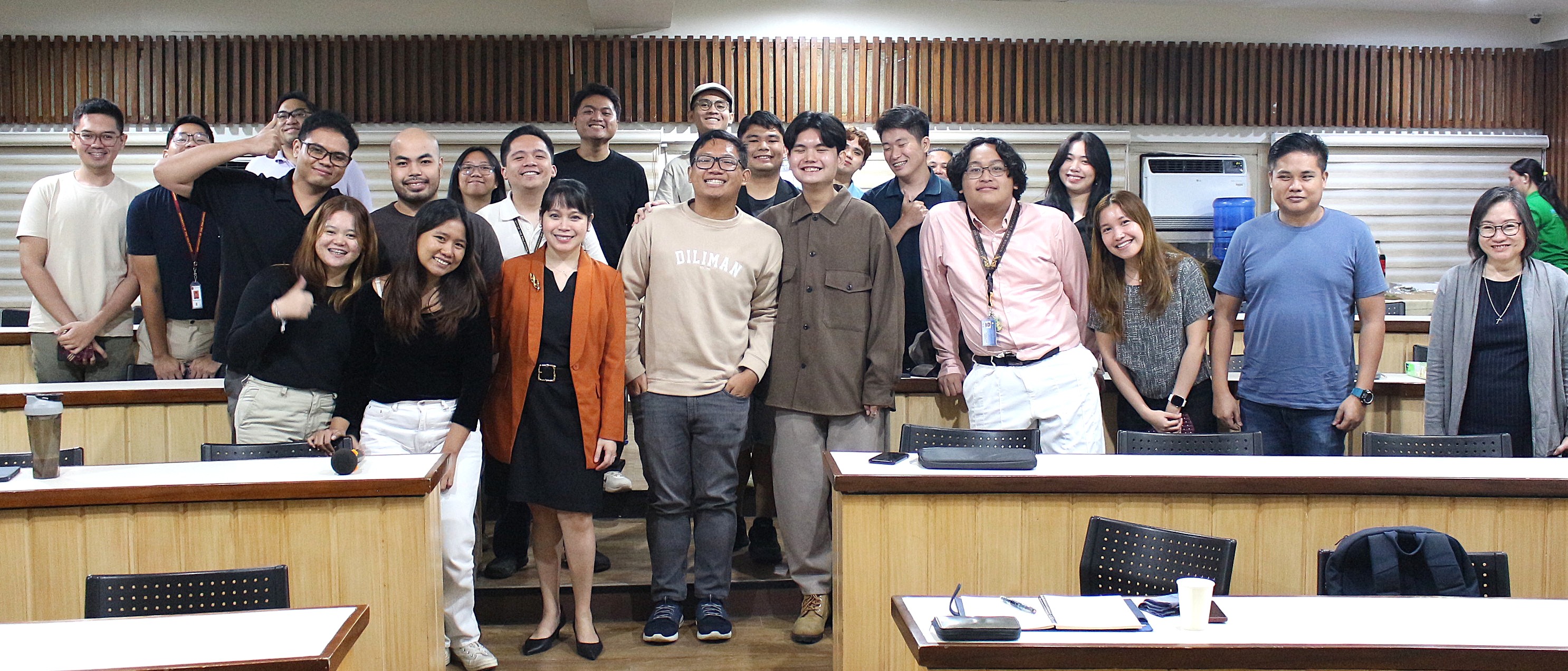 |
Childhood Nutrition and Labor Market Outcomes: Evidence from a Longitudinal DatasetDr. Karl Robert L. Jandoc, UPSE Assoc. Professor22 August 2025 |
|
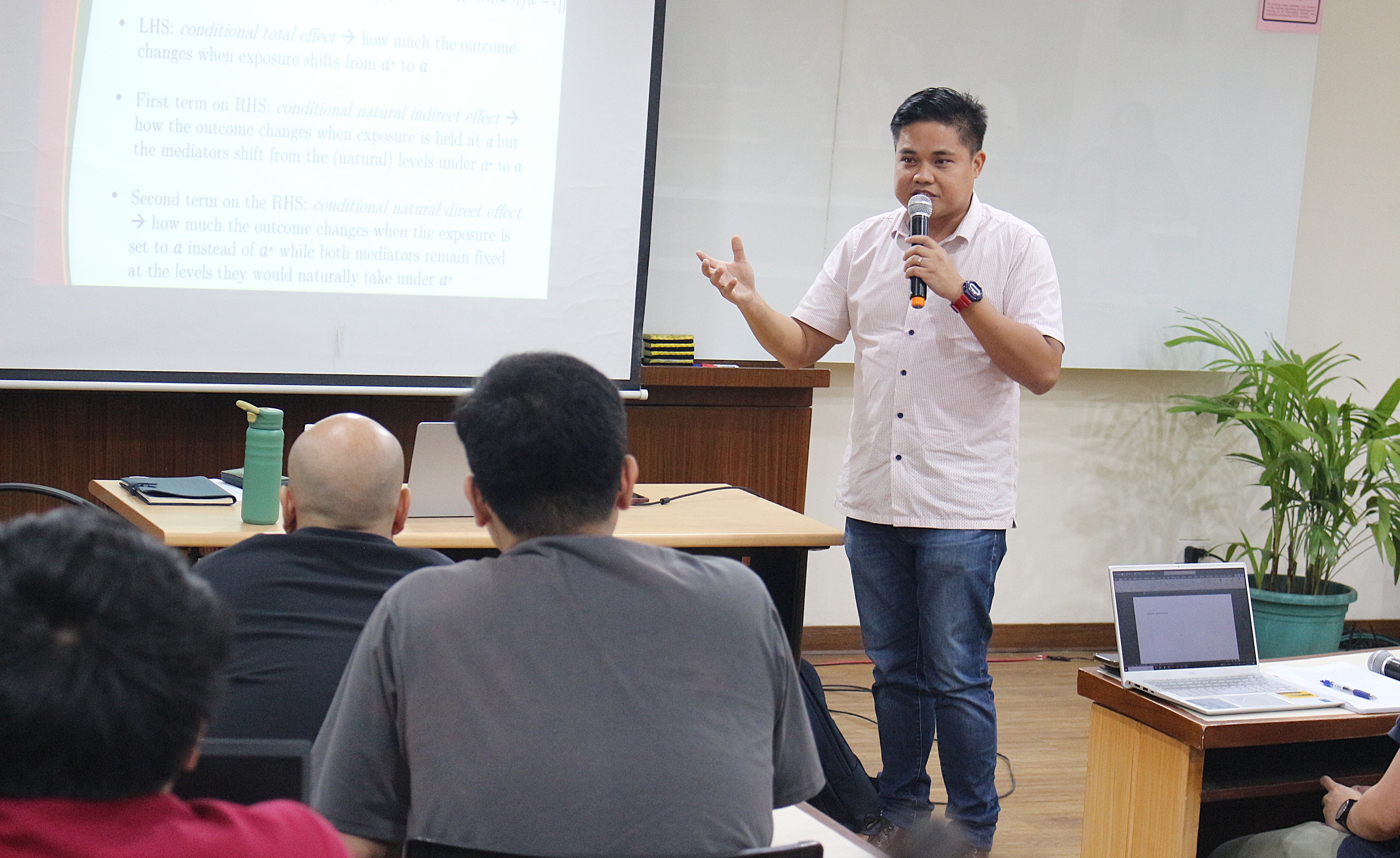 |
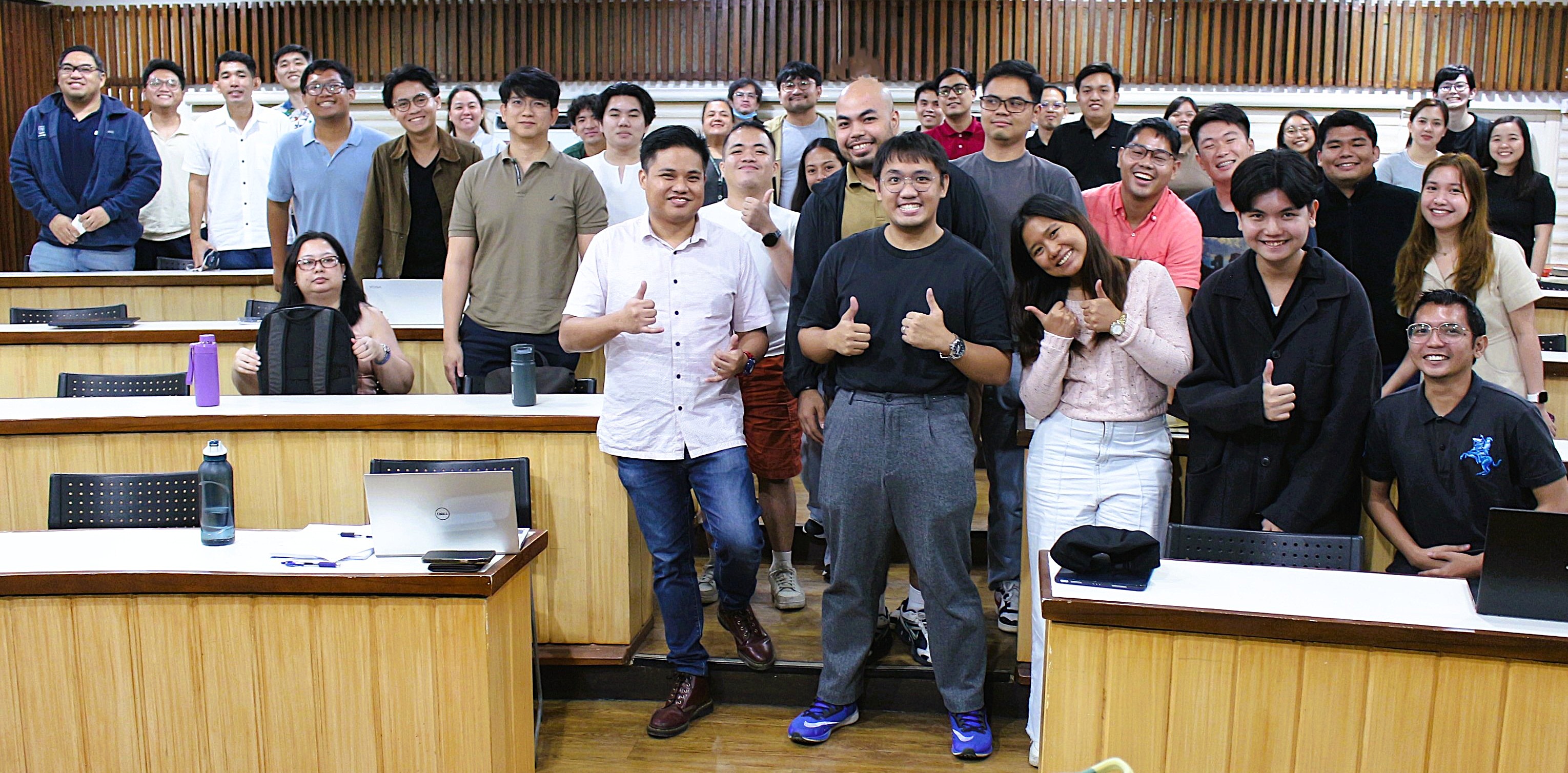 |
Is there a grade penalty for high school track and college degree mismatches? Evidence from the University of the PhilippinesDr. JC Punongbayan, UPSE Asst. Professor Dr. Jefferson Arapoc, UPLB Assoc. Professor15 August 2025 |
|
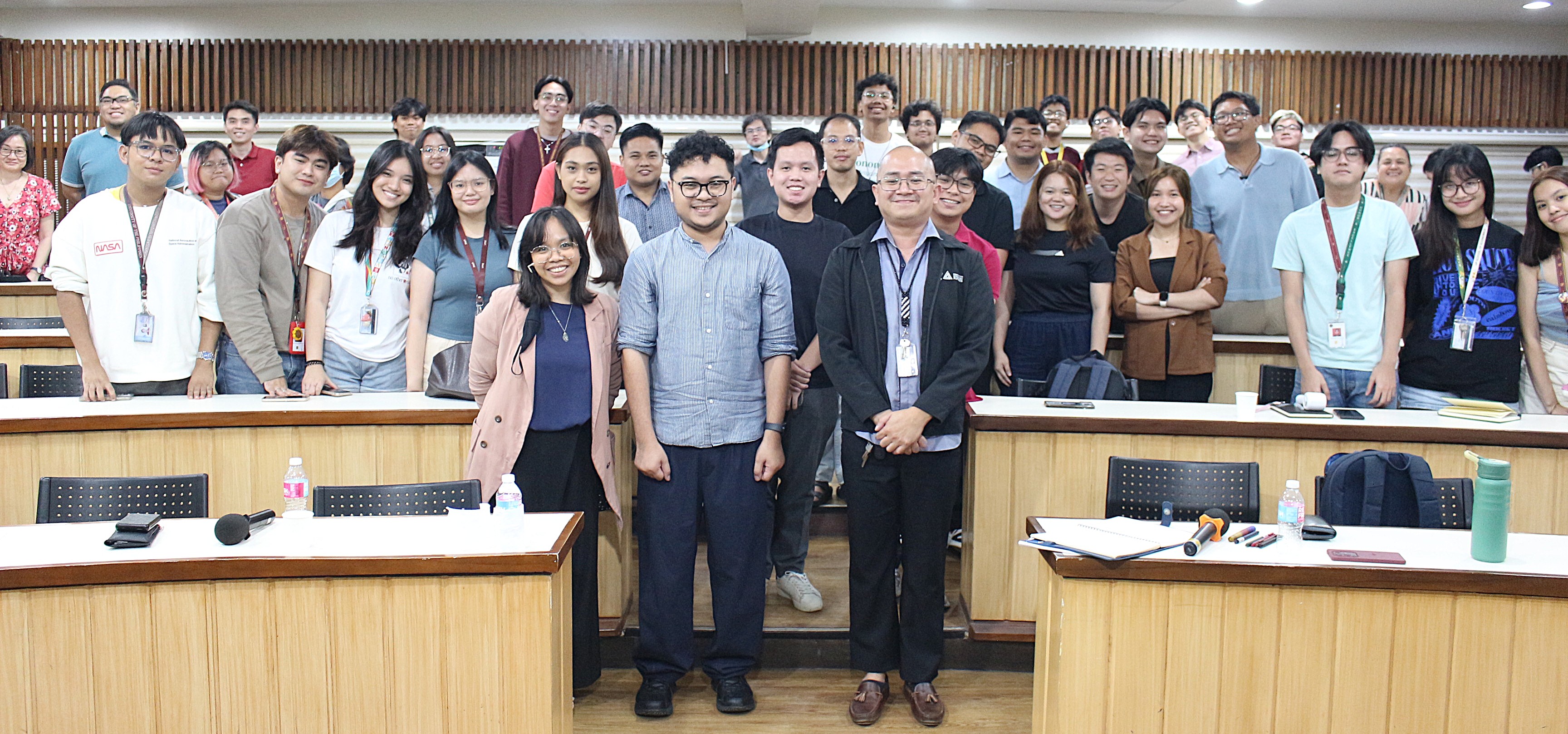 |
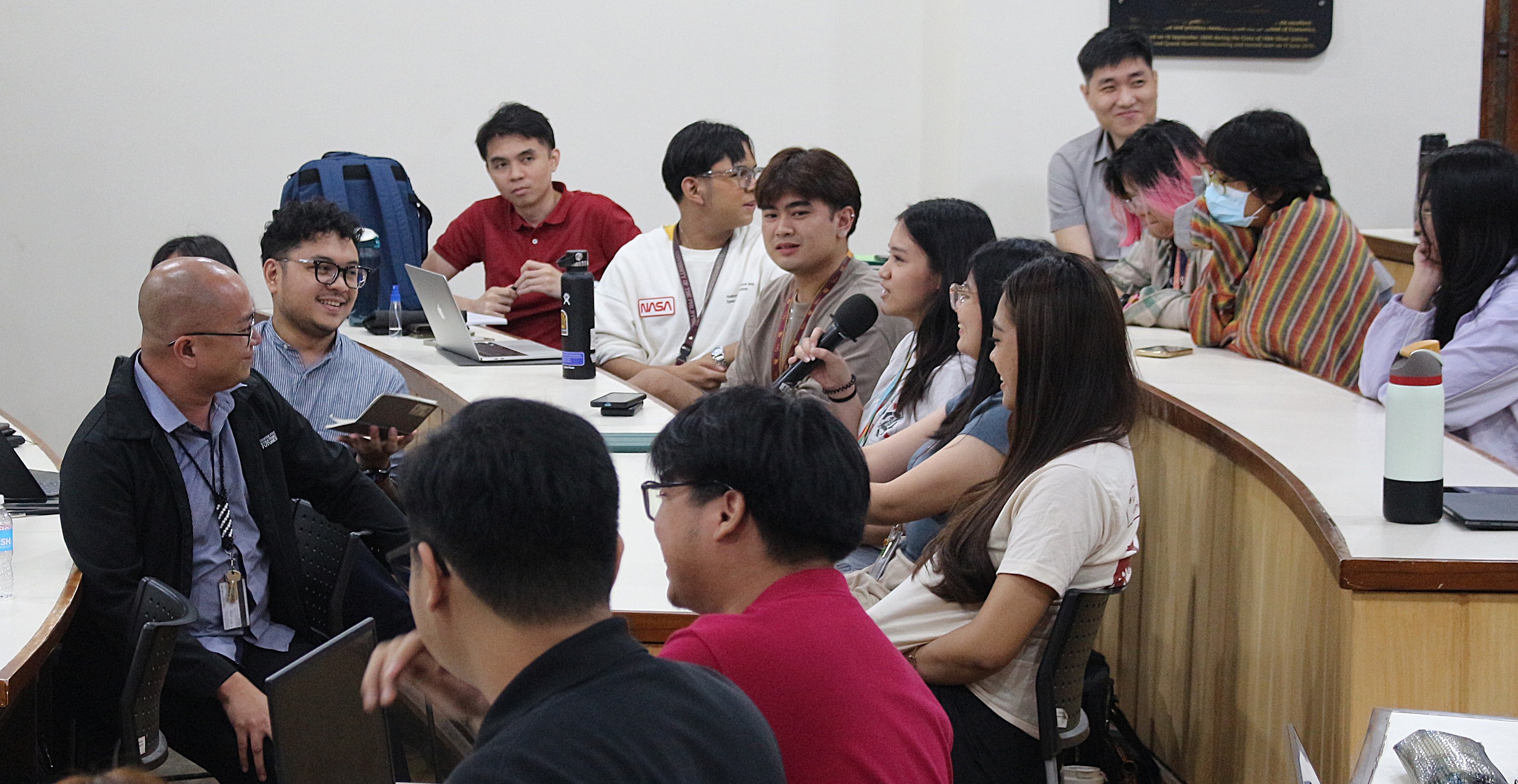 |
Trend Inflation in the Japanese pre-2000s:
|
|
|
|
|
The Long Shadow of Early Education: Evidence from a Natural Experiment in the PhilippinesDr. Dean Yang, Professor and Development Economist 15 July 2025 |
|
|
|
|
Spanish Commercial Policy and the Philippines: An Integrative ViewDr. Emmanuel C. De Dios, UPSE Prof. Emeritus 09 May 2025 |
|
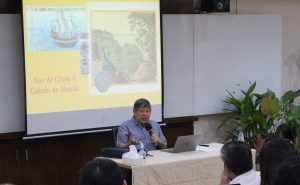 |
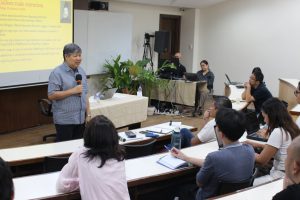 |
Examining Judicial Assertiveness in the Philippine Supreme CourtDr. Maria Cielo Magno, UPSE Assoc. Professor 2 May 2025 |
|
 |
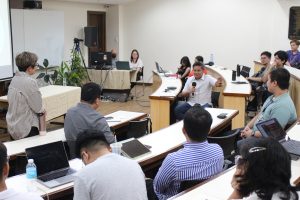 |
Grim Trigger Auctions in Repeated Procurement for MedicinesDr. Carlos “Chip” L. Vega, Acting Director III, Philippine Competition Commission 11 April 2025 |
|
 |
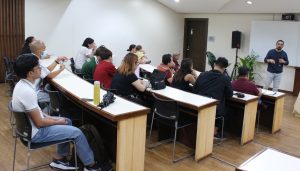 |
Group Entanglement and Esprit de CorpsDr. Raul V. Fabella, UPSE Prof. Emeritus, National Scientist 4 April 2025 |
|
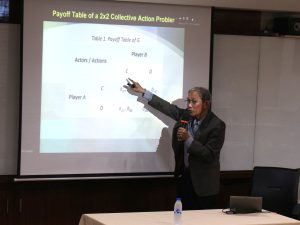 |
 |
Graduate Brown Bag Seminars
These seminars are designed to assist graduate students and undergraduate thesis writers in finishing their papers. This is also a venue for graduate students to present their proposals, theses, or dissertation chapters. Guest speakers discuss available datasets, possible research topics, methods, and other issues. These seminars are held on Wednesdays at noon.
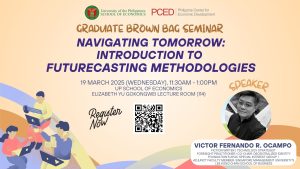 |
Navigating Tomorrow: Introduction to Futurecasting Methodologies
Victor Fernando R. Ocampo March 19, 2025 |
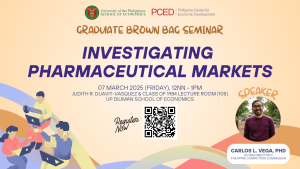 |
Investigating Pharmaceutical Markets
Dr. Carlos “Chip” L. Vega March 07, 2025 |
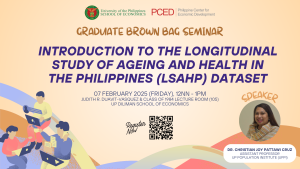 |
Introduction to the Longitudal Study of Ageing and Health in the Philippines (LSAHP) Dataset
Dr. Christian Joy P. Cruz February 07, 2025 |
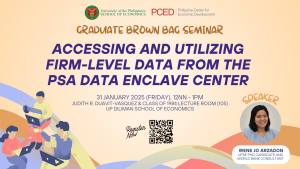
|
Accessing and Utilizing Firm-Level Data from the PSA Data Enclave Center
Irene Jo E. Arzadon January 31, 2025 |

